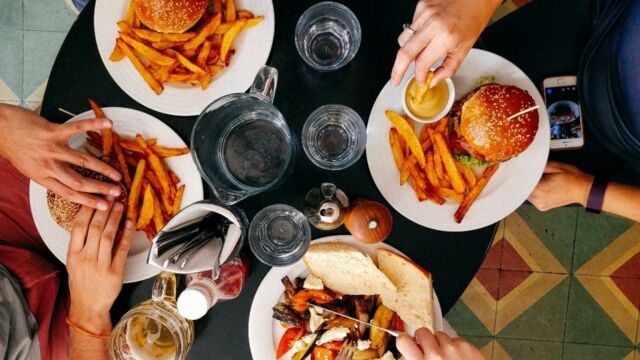After a meal, do you often feel the urge to lie down and close your eyes for a few minutes. Do you find yourself often plagued by heartburn, acid reflux and other bloating sensations? It's definitely a sign that you're overeating.
Discover our latest podcast
And you're not alone. According to a 2017 study published in the Global Nutrition Report, as many as two billion people worldwide are currently overweight or obese. But beware: just because you have a waspish waist doesn't mean your diet is perfect. Overeating can manifest itself in many different ways, as we explain here.
The effects of overeating
These somewhat uncomfortable feelings, such as heaviness and drowsiness, are known to be the result of overeating. To get through periods when meals are particularly copious, such as during the festive season, taking antacids may be enough to limit the effects of overeating, which will not have any significant physiological consequences.
However, if you eat too much over the long term, things can be very different. The specialist website Healthline warns that the long-term effects of overeating can lead to increased body fat, an increased risk of developing diseases such as type 2 diabetes, disruption of the sleep cycle and even... mental decline.
What happens in the body?
In detail, the accumulation of body fat is due to an excess of calories, from carbohydrates and fats. To avoid this excess fat, it is recommended that you try to fill up on lean proteins and non-starchy vegetables before eating carbohydrate and fat-rich foods.
Sleepiness is the result of a phenomenon called reactive hypoglycaemia, in which a person's blood sugar level drops shortly after eating a large meal. Reactive hypoglycaemia, therefore, manifests itself in symptoms such as drowsiness but also sluggishness, rapid heartbeat and headaches, and may be related to excessive insulin production.
Gas and bloating are caused by spicy and fatty foods, as well as carbonated drinks such as sodas. Certain vegetables (beans, whole grains) can also cause this reaction, as can a large meal if eaten too quickly. It is therefore advisable to eat slowly and to wait until the end of the meal to drink (preferably not soda, it goes without saying).
Overeating can also disrupt hunger regulation, which is the result of a fine balance between two hormones: ghrelin, which stimulates appetite, and leptin, which suppresses appetite. Eating foods high in fat, salt or sugar releases feel-good hormones like dopamine, which activate the pleasure centres in your brain.
And over time, your body may come to associate these feelings of pleasure with certain foods, which will not be the healthiest foods. In the long run, this process will eventually even replace hunger regulation, encouraging you to eat poorly for pleasure and leading to a perpetual cycle of overeating. To counteract this effect, it is recommended to eat 'pleasure' foods more slowly, to let the brain 'savour' its moment of fullness.
Risk of diabetes... and mental decline
Beyond the fat accumulation that can lead to obesity, other diseases can result from overeating. Such as type 2 diabetes, especially if your body has developed insulin resistance, which is closely linked to chronic overeating. Insulin resistance occurs when too much sugar in the blood reduces the ability of the hormone insulin to store blood sugar in your cells. To counteract this effect, it is important to cut out high-calorie processed foods.
Mental decline is also a possible outcome of overeating. Several studies link continuous overeating and obesity to mental decline in older people, compared to those who eat normally. According to this research, being overweight affects memoryin particular.
This article was translated from Gentside FR.
Read more:
⋙ Microwave oven: Does food become less healthy when microwaved?
⋙ Bad breath: Watch out for these common foods that can sour your breath















